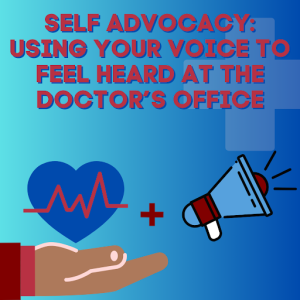Self Advocacy: How to Feel Heard at the Doctor’s Office
By Rowan Dunbar, C2ST Intern, University of Illinois Chicago
Have you ever felt that your doctor didn’t hear you during the ten to fifteen minutes they spent with you? Did you feel lost or concerned about what happened during your appointment? If you answered yes to any of these questions, you are entitled to self-empowerment in the form of self-advocacy! Self-advocacy is when you communicate your concerns or ask for the resources you need to succeed. Self-advocacy becomes an irreplaceable skill during medical visits because patients who speak up for themselves feel more satisfied with their healthcare and have better health outcomes.

Additionally, making yourself heard is a skill that can be used in many other aspects of our lives. Those who learn to assert themselves at the doctor’s office also tend to advocate for themselves in different situations. Self-advocacy in the clinical setting is also essential because healthcare has historically not been patient-centered. A patient-physician relationship has revolved around physicians being authority figures, meaning many don’t feel heard by their doctors.
Why now, and why me?:
Changes are just now being made in medicine to address this issue as more patients see doctors for health issues that can not be resolved in one visit or that are chronic. As a result, the role of the doctor shifts from the historical “fix it“ perspective to quality of life improvement and management. This shift in physician responsibility also means that the physician’s technique must change to an approach that tries to understand the patient’s concerns, lifestyle, current quality of life, and end goals. This also means that there has never been a better time for patients to learn to advocate for themselves and convey the information that doctors seek—additionally, self-advocacy results in better patient satisfaction for patients diagnosed with terminal illness.
Self-Advocacy and Minority Groups:
Research has shown that folks from different communities may experience barriers regarding self-advocacy. For instance, researchers found the disabled community has more trouble self-advocating. One major factor that could contribute to this is self-trust. Researchers found that whether someone trusts themselves plays a prominent role in whether they will advocate for themselves at the doctor. It has also been shown that people of color can face barriers to self-advocacy. For instance, black women are generally less likely to self-advocate. Even as it has become more widespread for people to investigate health issues on their own, black women who have researched health information independently are less likely to mention health information they have learned to their doctors during their visits.
Self-advocacy can be a tool to combat the effects of racism in healthcare, as cultural aspects may contribute to how folks of color feel communicating with their physicians. Physicians can only make decisions based on the information they are provided. This means that inefficiency in the self-advocacy process whether caused by patients or physicians can contribute to the unequal health outcomes we see between patients of color and white patients. Building the skill to self-advocate could have the opposite effect; research has also shown that black patients who advocate for themselves experience less interpersonal discrimination when talking to their providers.
Okay, Okay I understand it’s important – but how do I do it?
- Do your research – Learning more about what you are seeing the doctor for will give you more time to reflect on your concerns and learn a bit more about potential courses of action. Here a few reliable sources:
- Informed Health – This site is specifically designed to aid in evidence-based decision making in the healthcare system and in a study it was found as one of the most reliable resources for patients!
- The Center For Disease Control (CDC) – This government organization is the nation’s largest service organization for public health and has information available about a variety of health topics.
- MedlinePlus by the National Library of Medicine – This site was also found as one of the most reliable sites for patient’s to get health information! It is run by the National Library of Medicine and has health information about a large variety of topics.
- Make an ordered list of your concerns – Making a list of your concerns in order of importance can allow doctors to address the most pressing problems in your limited time together.
- Have your paperwork done ahead of time if you can – Having paperwork done beforehand can let your doctor focus on what matters most, you!
- Send your doctor a message in the portal the day before – Sending a message can let your doctor know more about what you will be coming in for and allows your doctor to better prepare for your appointment!
- Prepare a short opening phrase – This opening line should highlight why you are coming in and something to let your doctor know that you understand they have a hectic schedule! This can help foster a relationship with your doctor and make you feel more understood.
- Bring a supportive person along – If you cannot advocate for yourself, consider bringing someone you trust to talk for you!
- Get a second opinion – Don’t be scared to see another doctor if your concerns aren’t heard. Tell them your concerns and that you thought they weren’t addressed.
- Don’t be scared to switch to a new provider if you are ready and able – Just like a potential love interest or a job interview – sometimes things just won’t be the right fit, and that’s okay! It’s okay to establish care with someone else if you feel your doctor consistently does not listen to your concerns, and you should see a doctor you are comfortable with.
References
- https://onlinelibrary.wiley.com/doi/epdf/10.1002/hast.1522
- Self-Advocacy During the Medical Encounter: Use of Health…
- https://time.com/6974247/how-to-advocate-for-yourself-doctors/
- https://otservices.wustl.edu/self-advocacy-leads-to-better-health-well-being/
- https://covid19.nih.gov/news-and-stories/symptoms-long-covid-differ-people-different-racial-and-ethnic-groups#:~:text=The%20results%20of%20this%20study,and%20treated%20for%20Long%20COVID
- https://pmc.ncbi.nlm.nih.gov/articles/PMC9371681/
- https://pmc.ncbi.nlm.nih.gov/articles/PMC6381637/